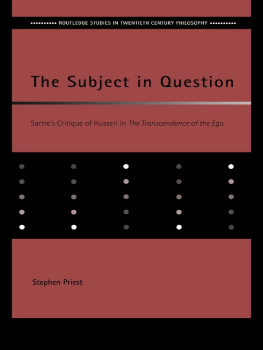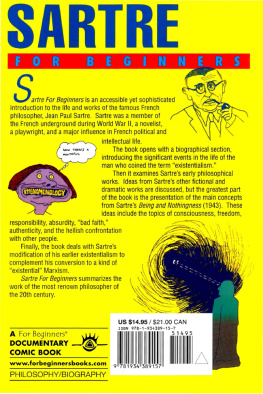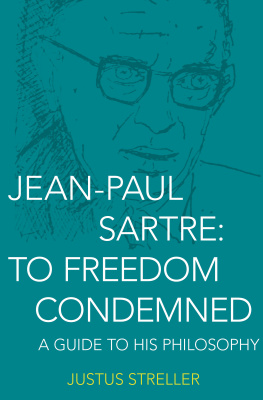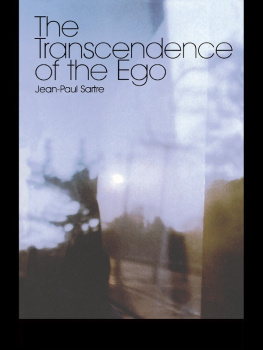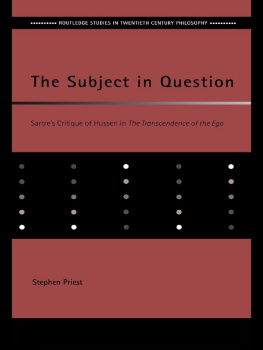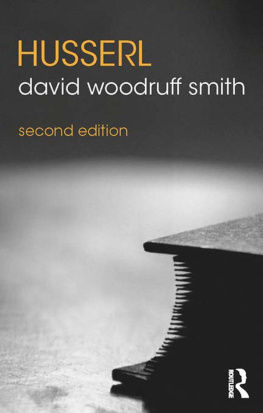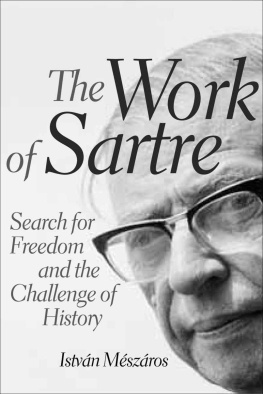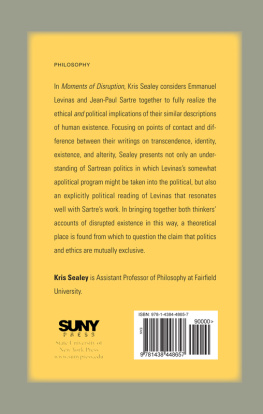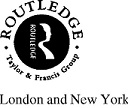First published 2000
by Routledge
11 New Fetter Lane, London EC4P 4EE
Simultaneously published in the USA and Canada
by Routledge
29 West 35th Street, New York, NY 10001
Routledge is an imprint of the Taylor & Francis Group
This edition published in the Taylor & Francis e-Library, 2004.
2000 Stephen Priest
All rights reserved. No part of this book may be reprinted or reproduced or utilised in any form or by any electronic, mechanical, or other means, now known or hereafter invented, including photocopying and recording, or in any information storage or retrieval system, without permission in writing from the publishers.
British Library Cataloguing in Publication Data
A catalogue record for this book is available from the British Library
Library of Congress Cataloging in Publication Data
Priest, Stephen.
The subject in question: Sartres critique of Husserl in The transcendence of the ego/Stephen Priest.
p. cm.(Routledge studies in twentieth century philosophy)
Includes bibliographical references and index.
1. Sartre, Jean Paul, 1905 Transcendance de lego. 2. Existentialism.
3. Phenomenology. 4. Consciousness. I. Title. II. Series.
B2430.S33 T736 2000
111dc21 99058540
ISBN 0-203-46143-6 Master e-book ISBN
ISBN 0-203-76967-8 (Adobe eReader Format)
ISBN 0-415-21369-X (Print Edition)
Preface
Consider for a moment some differences between you and everybody else. You look out of your own eyes but you look at or into other peoples eyes. You have never seen your own face, nor the back of your own head. In the case of just one human body (the one called your own) you feel yourself to be wholly or largely co-extensive with it. Perhaps you are inside your body or perhaps you are your body, looking out of it. In just this body but nobody elses you experience sensations and thoughts. The rest of the world seems physically arranged around you, with your body at its centre. You cannot in the normal course of things encounter your body as one object amongst others in the external world. This, on the other hand, is just how we encounter other peoples bodies, as living, speaking, expressive, but as over there.
These strange yet intimate phenomenological and physical facts are symptomatic of being oneself. We are so used to thinking in a general or abstract way that we fail to notice that something is me. Once noticed, this fact is at once obvious and extremely puzzling. For many people, for much of their lives, being what they are is an obstacle to noticing what they are.
Noticing ones own existence as ones own makes possible the understanding of a group of profound and interrelated philosophical questions: What is it for something to be me? Why is something me? What exactly have I claimed about somethinga mind, a brain, a body, a whole human beingwhen I have claimed that it is me?
What am I? does not necessarily capture the question. I am no doubt many things (a human being, a man, a biological organism, a thing that thinks, the only person born in that place at that time, the only person with that genetic make-up, etc.). The problem is that none of these facts says what it is for that thing to be me. What am I? does capture the question if it means What is it for something to be me?
The prospects for scientific attempts to answer these questions look grim. This is partly because descriptions of my existence and the theories of science are antithetical: I have a capacity to make choices, science is essentially deterministic. I have a past, present and future, science is tenseless. I have a psychological interiority, science only ever explains physical exteriority. Science cannot explain me because I am the opposite of what science says there is.
Is there, then, a cogent phenomenology of the self; a phenomenology which grounds the physical asymmetries between me and other people? Although Husserl, Heidegger, Sartre and Merleau-Ponty offer phenomenologies of the self which are putatively more fundamental than science, these do not form a homogeneous body of doctrine. The phenomenologists argue against one another. Sartres first substantial philosophical work, The Transcendence of the Ego, is an attempt to refute the answer to What am I? provided by Edmund Husserl in his transcendental phenomenology and replace it with a better one. Here I try to decide whether he succeeds, and see whether either Husserl or Sartre can shed any light on what it is for something to be me.

